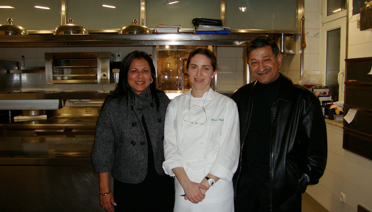
Every Monday, Clay Oven Irvine executive chef/owner Geeta Bansal
shares an interview that she's done with some of the heavyweights of
European cooking. Today, she regales us with a visit to the Basque country,
where Elena Arzak rules the kitchen alongside her legendary family. Enjoy!
]
Top Female Chef en el Mundo!
By Geeta Bansal, Executive Chef, Clay Oven Irvine
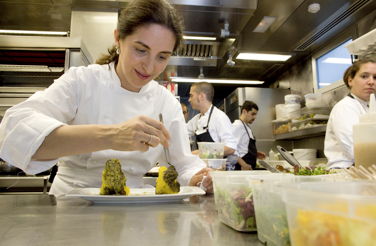
I am constantly trying to learn more about cuisines around the world and individuals in the culinary world who develop new cooking techniques and flavor profiles. Over the last decade, I have followed the career of Elena Arzak of the Arzak restaurant in San Sebastian, Spain. I was thrilled when Elena was named Veuve Cliquot's Top Female Chef of the World in 2012, part of the World's 50 Best Restaurants awards presented every year. The winner reflects Madame Cliquot's attributes of determination, innovation, and creativity with which almost two centuries ago she established the brand in her attempt to enter and survive in an all male wine industry. In 2011, Anne-Sophie Pic of France was the first recipient of this award. Over her career, Elena has received numerous awards and accolades such as Chef de L'Avenir in 2000, Cofradía de la Alubia de Tolosa in 2002, the Swedish Seafood Award 2011, La Gran Noticia Del Año Gastronomika 2012, and of course the Veuve Cliquot award last year, to name a few.
She is a petite, beautiful, soft spoken, young fourth-generation chef (barely 43) who is creative and inventive at the same time. Elena grew up in a household with many brilliant cooks including her grandmother, aunt, and of course her father Juan Mari Arzak, who is responsible for raising the profile of Spanish (particularly Basque) cuisine in the world. His restaurant obtained one of the first three Michelin stars in Spain for his restaurant Arzak, which Arzak has maintained since 1989, ranked 8th best in the world. Elena has accomplished an impossible task, emerging from the wings backstage of her father's fame into her own spotlight on center stage. She is the head chef along with her father at the only top ten restaurant in the world with a team that includes a female chef. She lives and works in San Sebastian along with her husband Manu Lamosa, a well regarded architect who has designed the kitchens and the salon at Arzak, and her two young children: Nora, who is eight, and her son Matteo, who is six. Aside from working alongside her famous father, she has trained in the top restaurants of Europe with chefs like Ferran Adria, Pierre Gagnaire, and Michel Troisgros, amongst others.
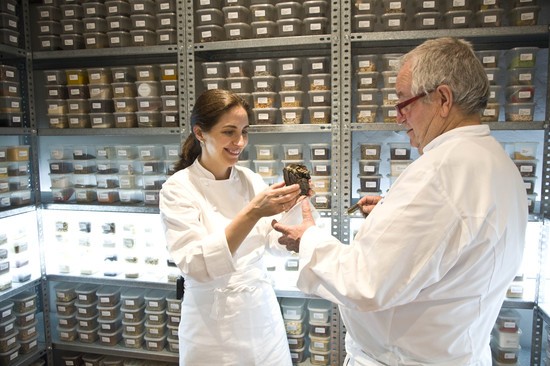
Elena, along with her father, is constantly exploring the boundaries of cuisine, attempting to create a new form of their Basque cuisine. All this occurs in the food lab that they operate on the restaurant premises. They work as a team, and each dish on the Arzak menu has input from both of them. This month, their new project Ametsa (which means “dream” in the Basque language), on which they have consulted, debuts at the Halkin hotel in London. Elena described it as a dream of a kitchen beyond our frontiers in the heart of London. According to her father, Ametsa will have a team led by Arzak's training and unique culinary style using locally-sourced and organic produce from the sea and land.

We first met many years ago when I celebrated a birthday at Arzak, and it was as if we were meant to know one another. After dinner we ended up discussing spices and unusual products used in Indian cooking. A few months ago, we attended a gala together and exchanged news, and she was still the same shy, unassuming person who has not changed in any way over the years that I have known her. The first thing she said was “Geeta, everyone is talking about you and whoever comes to Arzak and San Sebastian from California knows you and likes your food.”
I told her that it's just that every food lover I know has by now made it to San Sebastian and Arzak (many friends have made culinary explorations based on my hand drawn maps). She first wanted to know how I was doing after my battle with the big C last year and the warm hug did a lot for my spirit. Everyone who visits Arzak comes back raving about Elena not only for her food but her personality (once she walked people to the taxi waiting for them out front after dinner). Elena exemplifies that to be a good cook you have to be a good person first, as the food you create is a reflection of your personality.
I made a request to write about her and ask a few questions, and she said she would be happy to do that but I would have to write something that she thinks about me: “Do not be shy and write that I [Elena] admire you as a chef and your food is very inventive and interesting because you have adapted Indian cuisine and culture to the place where you live and work.”
She made me repeat it and said to write it down and she would be looking to read this in my article about her. That, in a nutshell, is trademark Elena: a gentle soul full of warmth, humility and passionate about everything and everyone. We keep in touch and in a conversation a few days ago her first concern was if I was taking care of myself and not doing too much (what with my pop-ups and demos). It is difficult to write about someone you appreciate as a person and the interview process this time was much more difficult for me.
My questions for Elena:
You grew up in a family-run restaurant environment, but did you make a conscious decision to embark on a career in this field? You first ventured into the family restaurant at the age of 11!
I decided myself with complete freedom to enter into cooking and gastronomy as a career. At 11, I was only allowed into the kitchen for 2 hours a day during summer vacations. It allowed me to be with my family, my parents, grandmother and aunt (they were both chefs). I liked the atmosphere and the creative process occurring in the kitchen. It was at the age of 18 after finishing my schooling in San Sebastian I decided to begin my career as a chef. I had also studied languages (she speaks Spanish, French, German, English and, of course, the Basque language of her region). I travelled abroad, studied and trained for six years before coming back to Arzak. I attended the Schweizerische Hotelfachschule, in Luzern, Switzerland and during this time did stages and internships at many restaurants and with many great chefs. I did a lot of training in hotels and restaurants abroad. (Her resume includes time at restaurants such as Michel Roux's La Gavroche, London, at Maison Troigros with Michel Troisgros in Roanne, with Pierre Gagnaire in Paris, Alain Ducasse's XV Monte Carlo, with Claude Peyrot at Le Vivarous, Paris, and at El Bulli, Rosas with Ferran Adria)
Does your sense of familial responsibility to uphold your family's tradition play a role in your professional life?
As you know, my parents gave me and my sister Martha (one year older) complete freedom to choose. My sister Martha studied art and art history (she is currently the Director of Education at the Guggenheim Museum in Bilbao) and I chose to pick up on the passion of my parents as sometimes happens when you are in a certain atmosphere and ambiance. Especially when you are born in a restaurant family, the love of cooking is contagious. My parents were happy with any choice we made and of course it made them happy when I chose gastronomy.
How do you classify your particular style of cuisine? I know it is rooted in the Basque culture but how have you interpreted it in a style that is uniquely your own?
My style is a signature style–Basque, evolving, avant-garde, research-based–passed through a filter of flavors and style rooted in the Basque culture. For example, you know that we use a mole taken from Mexican cuisine in my own style in a filter of Basque flavors, we use products like ginger from Asian culture and you know we have used the Tandoor from your culture as well. We use modern techniques to get the desired results and interesting flavors from the product.[

Do you think you set trends in the food industry, or vice versa?
Trends lead food in a certain direction. We have through our research created several techniques and styles that a lot of chefs use these days. Chefs can set trends and this I have learnt from my father that a chef has to be generous and share ideas with others. What is taken should be inspiration, not copying outright.
You live in a part of the world that is beautiful, it has a spirit of its own and a strong culture that revolves around food. Does it impact your creative process?
Thank you Geeta for appreciating our area. Food has always been important here, we don't know why but it is so. A few years ago there were anthropologists interested in this phenomenon and studies were done in this field. It is simply that an adoration for food is part of our culture and so is creativity and love of good product. We are fortunate to be in a privileged place in regard to the product that we have available to use.
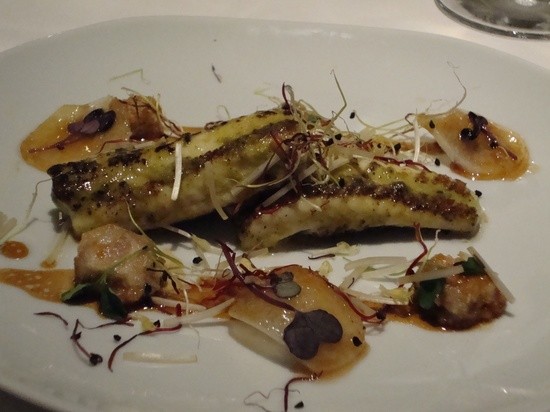
What part do you think emotions play in the creation of cuisine? Do you think a women chef's perception and creativity is enhanced by their inherent nurturing qualities?
Emotions are very important in cooking. If you cook with emotions you are able to have a dialogue with your diners. I like to have a sense of humor and make interesting presentations (for example, the clothespins out of lobster that she created for one of her presentations at the Gastronomika last year). We create plates that awaken emotion and curiosity in our guests. We don't want them to just come, eat and leave we want to have a dialogue with them through our food. In my opinion, sensibility is a personality trait and can be the same in a man or woman. It is about personality, not male or female. In our operation, 80% of personnel in the kitchen and dining room are women. We have six chefs de parti who are women so I grew up around women chefs and I did not know another situation.

Your father is a very revered figure in the culinary field. Has this put pressure on you to excel, which you no doubt have done? He must feel very proud of your accomplishment. I know as a woman in this field I feel so proud of you.
When I entered gastronomy my father was already very famous, but he is very humble and never changed with success. He taught me the same values. So I said why not do what makes me happy? I knew there would be comparisons. Though now I work in tandem with my father, I was only 19 when he encouraged me to make my first plate. I am fortunate to work with him and he has a very open mind and respects my work. He was so happy when I got the top female chef award last year that he cried for two days.
If you were to mentor other women entering the culinary field, what advice would you give them?
Most important, to be themselves. Today, there are many more women in this field; it is a social question of time. When young women come to stage or train with me I tell them to keep their individuality, to prepare well, get a good basis in a culinary school and get good training.
Is there any particular female chef that has impressed you?
For me it was an honor to be nominated with Anne Sophie-Pic and Nadia Santini. There are many others that I like as well and the list can be very long. Carme Ruscalleda from Spain especially. (My interview with Carme Ruscalleda is forthcoming) who I admire very much among others.
Most chefs in the world seem fascinated by Asia and South America at this time. Is that the direction you see yourself moving to or do you intend to stay with your Basque roots?
We cook with our own products and style but at the same time we use items from other food cultures like Asia and South America. What is traditional for other cultures is fresh and modern for us. Using these products and cooking style creates a richness and presents a new view of cuisine. But we are still based in our roots. For example we have a plate named Fu Fu from Africa on our menu; though inspired by Africa, it is presented in a different way at our restaurant. We have many dishes where we integrate other cultures.
Does your success at an early age give you more freedom to explore and create new formats for food or is it restrictive because you have already set the bar so high?
When I started out because of my parent's humbleness I concentrated on learning and training. I was focused on preparing myself for this career. My father being the extraordinary person that he is allowed me to create my first plate with his help when I was only 19. (Rene Redzepi of Noma related a story in his presentation about his first visit to Arzak on a night that Elena presented her first plate on the menu). Of course it was not 100% at that time but it encouraged me that some of my ideas could go on the menu. I try to stay focused and keep in mind that we cook for people and not for our personal success. For me it is important that the guests are happy. Awards show you that you are going in the right direction and of course I am very thankful for them.
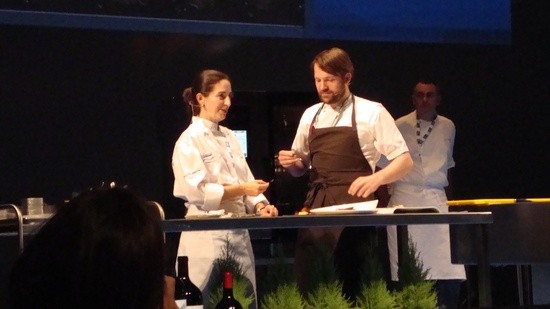
Do you enjoy the opportunity to meet chefs from other parts of the world when you attend conferences and symposiums? Any particular cooks you enjoyed meeting recently?
Meeting other chefs and seeing what they do is encouraging and exciting and enriching. You get ideas about other food cultures. You can ask questions and learn. Traveling is always good for the mind and creativity. This year at Madrid Fusion the invited country was Brazil. I enjoyed meeting that group of chefs but I could only stay one day as I had to get back to the restaurant. I learnt about products that I was not familiar with. For me it was very original, good to observe and fantastic to see the tastes they create, very original.
What do you think of chefs copying the work of others?
Chefs need to be generous and share techniques. But a good chef does not copy directly. It is good to be inspired but not copy exactly. Some techniques become standards for the industry. We all use techniques created by others. For example Ferran Adria's techniques are used by chefs all over the world. Today with all the information out there it is easy to know who developed a particular technique first.
[

Do you think the influx of reality shows with celebrity chefs about food and cooking has changed the average diners perception and expectations? If so, is it a positive or negative impact?
I think shows about everything related to food are good. These shows show not only one style but many different forms of food. I like shows to give a lesson on cooking also. People can choose where to go, elaborate or simple restaurants. In the end what they choose is good food. I would say good food is the most important criteria for diners.
The food industry is hard on family life (I have lived it for over 25 years). I know you grew up in a family in this business, but what is your experience so far?
If you like your profession you are happy. I am a fourth generation chef and I have learnt a lot about organization from my family, my mother and grandmother. Claro, food industry is not the only one with long hours. I am perhaps a privileged person that I can organize myself very well. San Sebastian is very small and I live very close to the restaurant so it makes it easier for me to manage everything. It is simply about liking what you do.
Do you cook for your family when you are home?
I like to cook at home. At the restaurant there are 30 chefs in the kitchen but when I am at home I cook alone. I like to cook with my husband and children. My children are six and eight and I am teaching them to cook a little as well. Not for a profession but just for them in their future life. They enjoy it as well.
What is the most requested meal from your family?
I like to cook fish and as you know we have great fish in our area and it is very popular in Basque cuisine. Basque chefs love fish. I cook hake with plums, grilled squid with onion marmalade etc. The hake is Nora's favorite and I will make it for her for her birthday after I come back. (Elena was going on a work related trip to Sweden last week and come back a day late for the birthday).
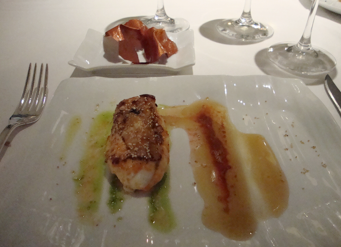
Would you like your children to follow you into the food world?
Of course if they do make the decision I will be very happy, but I want them to have freedom to choose. I will never push them but it will be nice if they do. If one of them decides to be a chef I will be very happy.
Your children are very young but do they already have distinctive palates? I ask because once when you were only five and your father took you to dine at a well known restaurant, you requested your meal to be cooked in a certain way.
My sister and I had the opportunity to come to the restaurant when we were kids. My children come to the kitchen now and then to see me or my parents. Our team is like a family with young and older people, and they are very kind to my children and they give them little tastes of things they're cooking, sometimes without my knowledge.
I notice already their developing tastes. They do not like their fish overcooked. At first when I gave them a taste of truffles they did not like it, they said it tasted of earth but now they like truffles. They like the rice crackers with curry. (I remarked “So Elena they like Indian flavors”)
They also like edible flowers, but they also as with other children they like pasta. They have both normal and more sophisticated tastes for their age. I like to see their reactions when they try new foods.
How do you spend your leisure time? What kind of activities do you like?
I don't have much time because we are busy at work like you Geeta. I like to be with my husband and children every chance I get. I also like to be with my family and friends. I love to travel. My husband understands my job very well and he knows I like to move and travel. It can be just 60 kilometers or another part of the world. My husband likes to travel as well and eat out and taste different foods.
What kind of music do you like? Any particular artist?
I like all kinds of music, classical and contemporary. My favorite group is Goldfrapp. I also like the Australian singer Sia. I like many things or I should say a variety and I am very enthusiastic about new things. I am of the opinion that there are many things that I don't know and would like to discover.
Where would you like to travel on a dream vacation?
I wish to go to Machu Pichu (I told Elena my original question was going to be about Machu Pichu which is on my bucket list and we laughed about it). I want to go to Japan and India to see the Taj Mahal. I hope to go to all these places soon.
.
How do you keep yourself so grounded despite your celebrity status all over the world?
I would say it is my family values, my education, and the people I work with. I am happy in my job and try to do my work with a lot of responsibility. There are many great chefs in this area like my father, Ferran Adria, Subijana and others and they are all normal people and they set a good example. When you asked me about women I admire I want you to write that I admire you as a chef. Take care of your health and come to Arzak soon.
Elena is on my list of the top ten people I have been fortunate to meet and get to know on my travels. I wish her an amazing future and much happiness with her lovely family.
Follow Stick a Fork In It on Twitter @ocweeklyfood or on Facebook! And don't forget to download our free Best Of App here!

